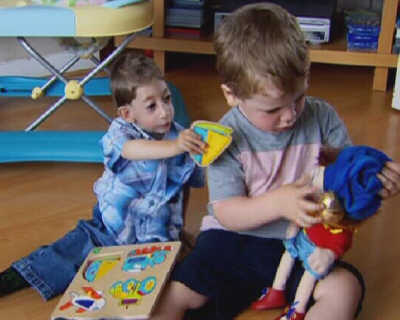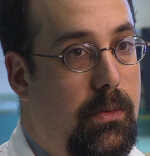Alex Connerty
Britain's Tiniest Boy - A Primordial Dwarf
Microcephalic Osteodysplastic Primordial Dwarfism (MOPD) Type II

Alex Connerty
Two year old Alex Connerty is one in three million, as he is a primordial dwarf. Unlike other forms of dwarfism, Alex's body will stay in proportion. He will always be a unique little man, never growing past three feet tall. But with this rare form of restricted growth comes restricted life-expectancy, he is not expected to live past thirty.
In a race against time, to find out if their son has a potentially fatal brain aneurysm, the Connerty family embark on an extraordinary journey to America. Here his parents will have to risk his life in a bid to save his life. What will the future hold for the tiniest boy in Britain?
Worldwide there are less than a hundred cases of microcephalic osteodysplastic primordial dwarfism type II. But, what makes children born with this condition so extraordinary is that their bodies are proportional but tiny.
Alex Connerty is thought to be the tiniest primordial dwarf in Britain. Alex is less than thirty inches tall and weighs the equivalent of six bags of sugar. His friend Patrick is also two years old, but unlike Patrick, Alex wears clothes made for a six month old baby.

Alex with Patrick, a normal two year old
Alex lives in Liverpool with Dad John and Mum Sue and her two children from a previous marriage. Alex was delivered at 32 weeks, by emergency caesarean, as doctors were worried he wouldn't survive in the womb. After 6 months of genetic tests, the Connertys were told what was wrong with Alex.
Dr Lynn Grennhalgh, Alex's geneticist explains "The primordial part of the title means Alex was small from the moment he was conceived and that is in contradiction to other forms of dwarfism where the baby can be a normal size until later in the pregnancy when the growth of the limbs slows down. The microcephalic part means a small head."
Although they had a diagnosis, doctors had never encountered a child like him before. Whilst researching Alex's condition on the Internet, the Connertys were alarmed to discover that primorial dwarves with MOPD type II rarely make it to thirty, because it can come with a potentially fatal condition. Dr Greenhalgh tells us "We know that some individuals with MOPD type II will have an aneurysm of one of their arteries or veins in their head which could rupture and bleed inside the brain".
In order to detect if Alex has brain aneurysms he would need to undergo a series of brain scans. However, when Alex was nine months old, a chest infection meant he had to be put on a ventilator, but when he was sedated by general anaesthetic he almost died from a cardiac arrest.
Now aged two, doctors have decided it's too dangerous for Alex to have a brain scan as it would involve a general anaesthetic once again. But, the Connertys feel it is a risk worth taking as they are living in fear of an invisible killer.
The duPont Hospital for children in Delaware has agreed to perform Alex's brain scan. This hospital is seen as a centre of excellence for children with MOPD type II. Sue and John also hope to gain valuable knowledge on their son's development. Alex is fed through a port in his stomach because he has struggle to swallow since birth due to his small jaw and oesophagus. But, eating isn't the only developmental milestone he hasn't hit. He doesn't walk or even crawl.
En-route to Delaware, the Connertys stop by Seattle for Alex to visit the Little People of America convention. Approximately 2,500 people attend this two week convention, with roughly have of these being people of restricted stature. However, Alex is one of only twenty primordial dwarves at the convention. As they have the rarest form of dwarfism they attract a lot of attention from the other little people.
Since meeting other primordial dwarves, Sue and John now have new concerns about their son's future. Alex is the only one who is tube-fed and not yet walking.

Dr Bober
At the duPont Hospital in Delaware, on the first day of the tests, the Connertys meet Dr Michael Bober, a genetic paediatrician and a specialist in Alex's form of dwarfism. After his examination, Dr Bober sees no reason why Alex is behind developmentally.
Next, the Anaesthesiology team will assess whether Alex will need to be put under general anaesthetic to have his brain scan. This could be life-threatening for Alex as they will need to intubate him by putting a tube down his throat, His airway is so tiny that, in the part, he has suffered cardiac arrest from this process, so everyone hopes that general anaesthetic will not be necessary.
Day two of the tests has Alex being X-Rayed to see if there is an anatomical reason why he is not walking. The X-Rays will be examined by Dr William Mackenzie an orthopaedic paediatric specialist. His hips and legs appear to be fine but, his feet have some deformity.
In the UK, Alex had splints specially made for him, but the were big and cumbersome, so Dr Mackenzie hopes to have new, more streamlined splints made.
Alex still faces the prospect of life-threatening sedation. American medics will only use general anaesthesia as a last resort but, with the day looming, Sue and John are having doubts about going against UK medical advice. The point of no return arrives when they are called to the anaesthetic room and are informed that Alex will need a general anaesthetic. Fortunately, on this occasion there are no complications.
Dr Bober explains the purpose of the scans "The general feeling is that aneurysms are weakening in the arterial walls and ultimately, given enough time, that wall will fail. Depending upon the location of the blood vessel, and other factors, that failure could lead to a haemorrhage and death or it may lead to a small stroke with temporary or permanent disability. Identified in time, it can be treated.".
In the post anaesthesia care unit, Alex is not completely out of the woods. As the anaesthesia finally wears off, although in no pain, Alex is distressed.
Later that day, Alex is fitted with his new splints and the transformation is amazing. With assistance from Dad, he takes his very first steps. Next day, the good news gets even better when Dr Bober gives them the scan results and reveals that there is no evidence of any aneurysm.
CREDITS: The above information came from the UK Channel 5 "Extraordinary People" documentary series.
